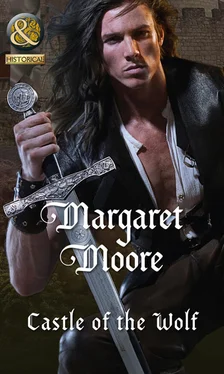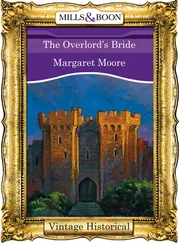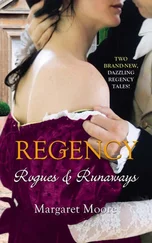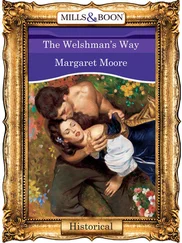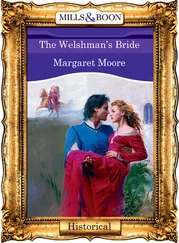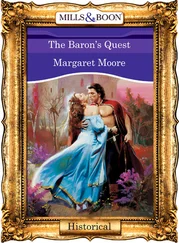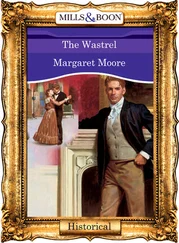There had been a time those whispers and insults would have infuriated Rheged. Now it didn’t matter what they thought of him, as long as he triumphed on the field. And if his long hair made them think he would fight with all the fierce determination of a savage, all the better.
Taking a deep breath of the fresher air, Rheged stepped into the courtyard and looked up at the cloudless sky. The full moon lit the yard as bright as day, yet there was a hint of rain on the wind. It would be a light rain, though. Likely not enough to postpone the melee.
A door opened in a long, low building to his left that was attached to the hall, sending a shaft of golden light onto the cobblestones. The noise of clattering wooden bowls, chopping and the querulous demands and orders of a harried cook told him it was the kitchen.
A slender, shapely woman in a dark gown and lighter over-tunic, carrying a large basket, slipped out of the kitchen into the courtyard. As she nudged the door shut with her hip, he recognized Lady Thomasina, his host’s niece, dressed in nunlike garments, her long, dark braid swishing down her back like a living thing. When he was introduced to her upon his arrival, he’d been impressed by the bright intelligence gleaming in her brown eyes. Later it became clear that she ran the well-regulated household, and not Lord DeLac’s beautiful daughter, Mavis, although that should have been her responsibility.
Rheged watched as Lady Thomasina crossed the yard to the wicket gate, the smaller door inside the huge double gate. Despite her relatively plain attire, Lady Thomasina had a dignity and a graceful carriage that no garment, however costly and well made, could enhance.
She spoke a few quiet words to the guards, who opened the wicket. Then he heard voices that sent his mind racing back to his childhood—the grateful words of the poor and hungry who would receive the remains of the feast.
“Thank you, my lady!”
“Bless you, my lady!”
“God save you, my lady.”
“There is plenty for all,” she replied. “Come closer, Bob, and take something for your mother, too.”
There would be no bruises or black eyes from scrambling for the scraps, or bellies left empty here, tonight.
Once upon a time, he had been among the beggars waiting at a lord’s gate with starving bellies and desperate hope, anxious to get even the smallest bit of bread or meat. The person doling out the remains—always a servant, never a lady—had usually dumped the food on the ground like so much refuse and looked at those eagerly awaiting as if they were worth even less.
Leaning back against the wall, his eyes closed, he tried to shove the memories of those days of hunger and need, loneliness and desperation into the back of his mind. Those days were long ago. He was a knight now, with an estate of his own. It wasn’t a rich one yet, but in time, with effort—
“Sir Rheged?”
He opened his eyes to find Lady Thomasina standing in front of him, her empty basket over her arm, her brown eyes regarding him with grave concern. “Are you ill?”
He straightened. “I am never ill. I merely sought a breath of fresh air.”
She frowned, her eyebrows drawing together, her full lips turning down at the corners. “You found the hall too smoky or stuffy?”
“No more than most.”
“Nevertheless I shall see that more of the shutters in the hall are open.” She turned as if she intended to do that at once, and by herself.
“I wouldn’t bother. It’s going to rain soon,” he said as she started to hurry away.
She turned back. “Rain? The sky is clear.”
“I can smell it on the breeze—not a heavy rain,” he hastened to assure her. “Likely just a shower during the night, so not enough to delay the melee.”
“I hope not.”
“I’m fairly certain.” He gave her a little smile. “I grew up where it rains much of the time, Lady Thomasina.”
“Tamsin,” she said quickly, then just as swiftly added, “That’s easier to say than Thomasina.”
“Tamsin,” he quietly repeated.
She moved the basket in front of her. “I’ve heard you called the Wolf of Wales,” she said, repeating the nickname given to him after his first tournament triumphs. “Are you so ferocious?”
“Not as much as I was in my youth.”
“You’re hardly an old man!”
“Older than some here.”
“Surely that gives you the benefit of experience, as well as reputation.”
“Experience, aye, and a reputation has its purpose, although it’s not for fame I fight. Unlike your uncle, I’m not a wealthy man.”
The moment he mentioned his poverty, he regretted it. She didn’t need to know about that, nor did he want her to think the less of him because of it.
“You fight for money.” To his relief, she didn’t sound appalled or disgusted. She sounded...matter-of-fact. Practical. Accepting.
“I fight to earn more, to keep what I have.”
She nodded slowly, thoughtfully. “Life gives us all battles to fight and we all try to win as best we can. I wish I could fight some of mine with sword or mace.”
“I don’t doubt you’d be a worthy foe. The clever ones are always hardest to beat.”
“You flatter me, my lord,” she replied, and not in the usual manner of coy young ladies.
She said it warily, with suspicion, as if she doubted his sincerity or perhaps wasn’t used to receiving compliments.
Thinking it might indeed be the latter, he made a sweeping gesture encompassing the inner courtyard. “It takes intelligence to run a household the size of Lord DeLac’s, and there’s no doubt in my mind that falls to you. You do it well, my lady. I’ve never experienced such comfortable accommodations or fine food.”
“My uncle is known for the excellence of his feasts.”
“Because of you, I’m sure.”
He saw the hint of a shy smile. Charmed and encouraged, he went on. “You have grace and beauty, too. That is a rare combination, my lady.” He ventured closer. “I think you are a rare woman.”
She stepped back and to his dismay, that suspicious wariness returned. “Are you trying to seduce me, sir, with empty words of praise?”
“I meant what I said.”
“And now I suppose you will tell me that Mavis is lacking compared to me.”
“She looks lovely, I grant you,” he replied, “yet I do find her lacking. She seems almost a shadow compared to you. I doubt she concerns herself with anything more than what gown she’ll wear or who she’ll dance with at the feast.”
The lady bristled. “Mavis is not such a ninny and you earn only my enmity if you criticize her.”
Clearly Tamsin loved her cousin dear and he hurried to mend his mistake. “I admit I have little knowledge of her, and no doubt she’s a fine young woman, but vitality and passion shine in your bright eyes, my lady, and you cannot deny that you take responsibility for the running of the household of DeLac.”
His words didn’t have the effect he desired, which was to make her linger.
“Thank you for your compliments, sir knight,” she said, starting toward the kitchen once more. “If you’ll excuse me, I do have many responsibilities, so I give you good night.”
“Sleep well, my lady,” he murmured in his low, deep voice as she hurried away.
* * *
It was all Tamsin could do not to break into a run as she left the unexpectedly grateful and flattering Wolf of Wales.
To think of such a man saying such things to her—plain, dutiful, responsible Tamsin! He was by far the most intriguing man she’d ever met, and not just because he was handsome, although he was the sort of man to make a woman look twice in spite of his stern visage. His eyebrows were like black lines above watchful dark eyes, and the planes of his cheeks and line of his jaw were as sharp as a sword blade. He dressed plainly in black, with no jewelry or other adornment.
Читать дальше
